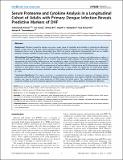Serum Proteome and Cytokine Analysis in a Longitudinal Cohort of Adults with Primary Dengue Infection Reveals Predictive Markers of DHF
Author(s)
Kumar, Yadunanda; Liang, Cui; Bo, Zheng; Rajapakse, Jagath C.; Ooi, Eng Eong; Tannenbaum, Steven Robert; ... Show more Show less
DownloadTannenbaum_Serum proteome.pdf (1.308Mb)
PUBLISHER_CC
Publisher with Creative Commons License
Creative Commons Attribution
Terms of use
Metadata
Show full item recordAbstract
Background:
Infections caused by dengue virus are a major cause of morbidity and mortality in tropical and subtropical regions of the world. Factors that control transition from mild forms of disease such as dengue fever (DF) to more life-threatening forms such as dengue hemorrhagic fever (DHF) are poorly understood. Consequently, there are no reliable methods currently available for early triage of DHF patients resulting in significant over-hospitalization.
Methodology/Principal Findings:
We have systematically examined the proteome, cytokines and inflammatory markers in sera from 62 adult dengue patients (44 DF; 18 DHF) with primary DENV infection, at three different times of infection representing the early febrile, defervescence and convalescent stages. Using fluorescent bioplex assays, we measured 27 cytokines in these serum samples. Additionally, we used multiple mass spectrometry methods for iTRAQ-based comparative analysis of serum proteome as well as measurements of protein adducts- 3-nitrotyrosine and 3-chlorotyrosine as surrogate measures of free radical activity. Using multiple methods such as OPLS, MRMR and MSVM-RFE for multivariate feature selection and classification, we report molecular markers that allow prediction of primary DHF with sensitivity and specificity of >80%.
Conclusions/Significance:
This report constitutes a comprehensive analysis of molecular signatures of dengue disease progression and will help unravel mechanisms of dengue disease progression. Our analysis resulted in the identification of markers that may be useful for early prediction of DHF during the febrile phase. The combination of highly sensitive analytical methods and novel statistical approaches described here forms a robust platform for biomarker discovery.
Date issued
2012-11Department
Massachusetts Institute of Technology. Department of Biological EngineeringJournal
PLoS Neglected Tropical Diseases
Publisher
Public Library of Science
Citation
Kumar, Yadunanda, Cui Liang, Zheng Bo, Jagath C. Rajapakse, Eng Eong Ooi, and Steven R. Tannenbaum. “Serum Proteome and Cytokine Analysis in a Longitudinal Cohort of Adults with Primary Dengue Infection Reveals Predictive Markers of DHF.” Edited by Alan L. Rothman. PLoS Negl Trop Dis 6, no. 11 (November 29, 2012): e1887.
Version: Final published version
ISSN
1935-2735